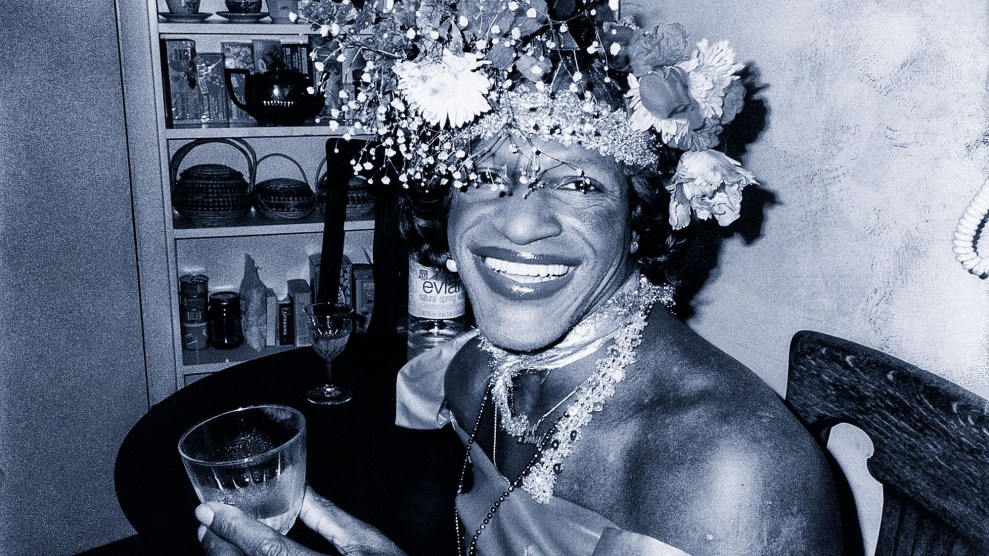
Netflix
On Friday, David France’s award-winning film, The Death and Life of Marsha P. Johnson, began streaming on Netflix. It is a stirring piece of art that explores the controversial death of Johnson, a black woman who was an icon of transgender rights in the United States. Her attitude toward the cultural conservatism of the time was captured by her self-chosen middle initial, P, which she said stood for “pay it no mind.” She is rumored to have been among the first to confront police during the Stonewall Rebellion of 1969, she co-founded one of the first grassroots groups to provide do-it-yourself social services to transgender women in New York City’s West Village, and she remained a staple of the LGBT-rights movement until her body was discovered floating in the Hudson River on July 6, 1992. France’s film tells the story of those left to grapple with her death and carry on her legacy.
Allegations that surfaced over the weekend also claim the film is based on the uncredited work of a transgender woman of color.
Reina Gossett is a community organizer and filmmaker based in New York City who identifies as transgender. Along with Sasha Wortzel, a filmmaker whose work focuses in part on queer and transgender identities, she has spent the past three years raising funds for a short film documenting Johnson’s life and legacy called Happy Birthday, Marsha!, which, according to the film’s website, is in post-production. A trailer for the film was posted on Vimeo in 2015:
On Friday, Gossett alleged in an Instagram post that France’s film relies on her research on Johnson, which goes uncredited: “This week, while I’m borrowing money to pay rent, David France is releasing his multimillion dollar Netflix deal on Marsha P. Johnson.” She added, “This kind of extraction/excavation of black life, disabled life, poor life, trans life, is so old and so deeply connected to the violence Marsha had to deal with throughout her life.”
France has explicitly denied the allegations. When reached by Mother Jones Monday afternoon, France said, “Although I know that [Gossett] has spent her career as an academic and artist working in that area, I don’t have any first-hand knowledge of the work that she accomplished there, so I can say very clearly that it has not influenced my work.” This echoed the official response, published late Sunday night on the film’s Facebook page, in which France detailed his long interest in Johnson’s life and death. “I owe a debt to those who have kept Marsha’s story alive over the years,” he wrote of the work of Gossett and others. “My creative work builds on theirs. But it is its own scholarship.”
And responding on Twitter to people repeating Gossett’s claims, France insisted he had been following the case since his days reporting at the Village Voice in 1992 and that he and his production team “fully support Reina and Sasha’s beautiful film,” particularly as stories like Johnson’s “have been told before and must be told again with many voices, especially by trans women of color who an even harder time raising funds than we did.”
Hi Janet. Please see below. pic.twitter.com/sHjz9CvU7T
— David France (@ByDavidFrance) October 7, 2017
France also underscored this point with Mother Jones. “Sylvia [Rivera, Johnson’s longtime friend and organizing ally] and Marsha [P. Johnson] are both major historical figures in the LGBTQ history,” France said. “I think that historians and filmmakers should be making films about them in multiple ways and in multiple voices. I am a historian and I am a filmmaker, and I feel that that that work should fall to me, as it should fall to other people in order to be able to bring the story to larger and larger audiences.”
The Arcus Foundation, which helped financially support France’s work and is named directly in Gossett’s initial Instagram post, issued a statement to Mother Jones on Monday evening: “Arcus regrets that multiple parties, all of whom want the stories of trans people to be known to as many people as possible find themselves in an intellectual property dispute relating to the life of Marsha P. Johnson. We sincerely hope they are able to resolve it.”
Gossett declined to comment on the record. Wortzel did not responded to multiple requests for comment.
With all the contentious back and forth, it’d be easy to get lost in a conversation about ownership of archival footage. While that element cannot be overstated, the debate over the film and its origins are much more than that point alone. At its core, the discussion over France’s film brings to light questions of race, gender, access, and privilege: Who has the right to represent whom? Why and how do we account for a person’s privilege when building a historical record? They are questions, as Gossett suggests, that in many ways trace the struggles Johnson waged during her lifetime and that black transgender women are still fighting today.
To understand the intensity of the debate over France’s film, it is important to unpack the work of its subject, as well as the means in which that narrative has been told.
Johnson was assigned male at birth, on August 24, 1945. At five, she began wearing dresses, according to an interview that appeared in the documentary, Pay It No Mind: The Life and Times of Marsha P. Johnson. Around this time, she was raped by an older boy in her neighborhood. “I was young and naive,” she remembered. “So I stopped wearing dresses for a long time.” She came out as gay as a teenager and, after graduating high school in 1963, moved to New York City’s Greenwich Village; armed with her newfound freedom, she set out to become “the biggest drag queen in the world.”
At the time, the phrase “gay liberation” hadn’t yet emerged. Even in relatively libertine cities like New York and San Francisco, gay bars were routinely raided by police, and patrons, once arrested, were often publicly outed and humiliated by law enforcement. Laws forbidding men from wearing women’s clothing were common. Wearing clothing of a gender different from the one assigned at birth was largely seen as a single act of rebellion or performance, not an identity.
But collective rebellions started becoming more common. In 1966, transgender women and drag queens rebelled against a police raid at San Francisco’s Compton Cafeteria. Three years laters, on June 28, 1969, Johnson and Rivera, young and frequent patrons at the popular West Village bar Stonewall Inn, were present after an NYPD raid. The raid quickly turned into a riot, with patrons fighting back against police. Johnson and Rivera were center stage, allegedly throwing some of the first rocks and bottles. It was then that a movement was born.
The mainstream narrative of that movement, though, was not pretty—nor, arguably, was it exactly accurate. Days after the Stonewall Rebellion, the New York Daily News ran a story by a reporter named Jerry Lisker under the headline, “Homo Nest Raided, Queen Bees Are Stinging Mad,” that explained the event in pretty sensationalist terms: “Last weekend the queens had turned commandos and stood bra strap to bra strap against an invasion of the helmeted Tactical Patrol Force.” In fact, the first reports of Stonewall in both the New York Daily News and the New York Times focused as much attention on the rebellion as they did on four police officers who had been hurt during the melee.
While the LGBT community, broadly speaking, was a target of homophobia in the mainstream press and in mainstream culture, the burgeoning gay liberation movement’s leaders often focused on and pushed the interests of white gay men, who still enjoyed relative degrees of social privilege. During a Gay Liberation rally in 1973 in Washington Square Park, Rivera had to fight her way onto the stage, where she issued a heartfelt plea to the larger gay community to stop ignoring the plight of its transgender members:
I have been to jail. I have been raped. And beaten. Many times! By men, heterosexual men that do not belong in the homosexual shelter. But, do you do anything for [me]? No. You tell me to go and hide my tail between my legs. I will not put up with this shit. I have been beaten. I have had my nose broken. I have been thrown in jail. I have lost my job. I have lost my apartment for gay liberation and you all treat me this way? What the fuck’s wrong with you all? Think about that!
She was booed off stage. France’s documentary includes footage of Rivera recounting the speech years later: “I was hurt and I felt that the movement had completely betrayed the drag queens and the street people, and I felt that the years that I had already given them had been a waste.” When she went home that day, she attempted suicide. Johnson found her as she was bleeding to death. “If it wasn’t for Marsha, I wouldn’t be here right now,” Rivera tells the interviewer in footage that now appears in France’s film.
Johnson and Rivera, who was Puerto Rican and Venezuelan, were trying to break the mold and bring to the forefront the more nuanced identities in the movement: people of color who sometimes had no jobs or homes, and whose lives were shaped not just by homophobia, but also by racism, classism, and a host of other social forces. Their stories, though, continued to be largely ignored as the movement grew over the following decades. By the late 1990s, when Ellen DeGeneres came out publicly to Rosie O’Donnell, signaling an important cultural shift in the acceptance of gay people in mainstream culture, Rivera was homeless and living amid cardboard boxes along Christopher Street Pier, which for generations has been a popular gathering spot for queer and transgender people of color. France’s film includes heartbreaking footage of Rivera being forced off of the pier by New York City police officers to make way for what would eventually become Hudson River Park, a multi-million dollar renovation project. Johnson, meanwhile, had been dead for four years. Neither were household names associated publicly with the broad narrative of the Stonewall Rebellion.
In 1992, when Johnson’s body was found in the Hudson, David France, who is white and identifies as gay, was a journalist covering the LGBT beat for the Village Voice. The AIDS epidemic decimating the generation of LGBT people who had come of age during the gay liberation’s sexual revolution of the ’70s and ’80s was his beat’s biggest story. Johnson had been a friend of France’s, and he dug around the circumstances of her death but didn’t get far, he has said subsequently, so her story took a backseat to coverage of the epidemic and the federal attention it was starting to receive. Johnson’s death received scant news coverage at the time, save for limited stores on the candlelight vigils organized by her community, footage of which appears in France’s film.
France went on to work for New York and Newsweek and to write several books. In 2012, he released his first film, the documentary How to Survive a Plague (currently also streaming on Netflix) about AIDS activism and the legacy of the epidemic. It was nominated for an Academy Award for best documentary feature. The Death and Life of Marsha P. Johnson is his second film and it is centered on a transgender organizer named Victoria Cruz who has spent years on a quest to uncover the truth about Johnson’s death.
France told Mother Jones that Johnson’s story had remained on his radar for years. “I returned to that period, both in footage and my reporting notes,” he said. In the spring of 2011, he and his editor, Tyler Walk, put Johnson’s name on a card on a board in their editing suite as a story France wanted to pursue next.
France declined to reveal his budget for The Death and Life of Marsha P. Johnson, but he did say that he “never finished raising funds for the budget,” meaning the production ended in debt. He says he was able to license footage from people who had shot the original video, such as interviews with both Johnson and Rivera, who had long since passed away. He was also able to put together a crew and pay them. But fundraising for his film about Johnson’s life was considerably harder than it was for How to Survive a Plague. “I know how much easier it was to raise money for cisgender gay boys as subjects for a documentary than it was to raise money for trans women of color,” France said. “And it’s got to be a thousands times more difficult for a transgender artist of color to raise that money.”
Gossett does not feature directly in the film nor is she mentioned in the film’s credits. But, as a longtime organizer, activist, and researcher in New York City, she has gained respect from LGBT artists and activists over the past decade, particularly for her work to abolish prisons. Starting in the early 2000s, Gossett was organizing queer and transgender youth along the Christopher Street Pier and would hear from elders about Johnson and Rivera’s legacies. She began informally collecting stories. Soon, she began visiting public and private archives to obtain video, audio, and printed footage of their lives and activism to include on Vimeo, her own blog, and in a newsletter distributed to prisons by the Sylvia Rivera Law Project. Her work was based on the idea that while no one person or private entity outright “owns” history, Johnson and Rivera’s work, which for so long had been ignored by the white mainstream of the LGBT movement, belonged to the communities from which they came. She notes in her Instagram post that as she did this work, was harassed archive owners, enduring the type of discrimination that Johnson and Rivera spent their lives trying to challenge.
As part of that work, Gossett began developing a scripted short film that re-creates the hours before Johnson and Rivera went to the Stonewall Inn on that fateful night in 1969.
Gossett and Wortzel published a statement to go along with the short film’s trailer on their website in 2015. “It’s been over 45 years since the Stonewall Uprising yet the leading role that street queens, trans women of color and gender non-conforming people played during the riots has never received the recognition it deserves,” they wrote. “By making Happy Birthday, Marsha!, we are seeking to change that.” They close that statement with perhaps the most important declaration of all: “This is the first time trans women of color are on both sides of the camera.”
As Gossett’s work grew, so did the attention paid to the lives and deaths of black transgender women. One inescapable function of France’s film is the connection it makes between the past violence faced by transgender women of color and the present ways in which their lives are routinely taken. In this instance, Cruz, France’s main protagonist, is piecing together Johnson’s death while also rallying to bring attention to what activists now call the epidemic of violence against black transgender women. For the general population in the United States, 1 in 19,000 people is murdered every year. For young black transgender women, the chance of being murdered is 1 in 2,600, according to an award-winning project led by Meredith Talusan documenting such cases. Sometimes their killers are convicted of crimes related to their deaths, but that is the exception, not the rule.
Even still, the stories of these women have gone largely untold or, outside of Gossett and a few peers, have not been told by the women who lived these experiences. Elle Hearns, an organizer who helped build Black Lives Matter, founded the Marsha P. Johnson Institute in 2015 in part as a response to such murders and the lack of attention given to them by mainstream media. Hearns, who is a transgender black woman, says that she had heard about Gossett’s work for years, and that it included fighting New York City’s public libraries to access archival records and painstakingly tracking down newspaper clippings. When Hearns decided to found an organization named after Johnson, the first person she reached out to was Gossett. “If the support was provided for Reina to really examine her research and all of the labor that she put in to archiving Marsha’s life and her work and her words,” Hearns says, the public’s understanding of Johnson’s contributions to the LGBT movement would be more complete.
Hearns says that she was personally invited by France to screen the film’s opening, and she attended. But watching the discussion of its premiere on Netflix unfold since then, she says, has felt disturbingly familiar. “I think this particularly highlights anti-blackness and erasure of black trans women and that is such a common experience that black trans women have in our lives around our work and our labor, but also our love,” Hearns tells Mother Jones. “It’s Reina’s love of Marsha P. Johnson that really created the operating space for so many of us, including David France, to exist.”
(France admits that he is “standing on the shoulders of other people who have been historians,” but insists “there is no footage in the film that is [Gossett’s] footage. There is nothing in the approach to the film that comes from anybody but myself.”)
Hearns acknowledges that France’s portrayal of Johnson’s life and death is just a tiny microcosm of the much larger issue. Transgender directors do exist in filmmaking more broadly, but they are rare. Though the subject matter of film and television has grown incrementally more diverse in recent years (see: Tangerine and Transparent), filmmaking itself remains an overwhelmingly white and male enterprise. Women comprised just 7 percent of all directors working on the 250 highest grossing domestic releases in 2016, according to the Center for the Study of Women in Television and Film at San Diego State University. Researchers at University of Southern California studied the top 1,000 highest grossing films of the past decade and found that only three were had black women directors, three had Asian women directors, and one had a Latina director. The report made no mention of whether or not any of those women identified as transgender.
For Hearns, too, it’s not just about who has the right to tell the story, but how they tell it. For instance, she thinks France’s film misses an important opportunity to interrogate state violence—a vital part of Johnson’s politics. The film focuses on Cruz’s fight to re-investigate Johnson’s death, and depends in parts on the work of police detectives who showed little to no interest to revisiting the story. “Marsha’s work was around keeping poor people and trans people safe from the police,” Hearns tells Mother Jones.
“When black trans women tell our stories, our stories are much more reflective of our realities and the lives that we’ve lived as opposed to the very sanitized image that is often presented by white filmmakers and…white LGBT communities,” Hearns adds.
The bottom line is that the conversation over the ownership of black trans women’s work is about much more than one film. What’s happening with Gossett and France is “relevant to what I’ve seen happen to my own work in movement spaces, or what I’ve seen happen to other black trans women’s work in movement spaces,” Hearns says, noting that black trans women who try to assert ownership over their work are often unfairly seen as spiteful or retaliatory. “For me, I’m still thinking about how people who are not even considered with the likes normalized culture [are] utilized and then discarded.”
In the end, France’s film is an important addition to the historical record on Marsha P. Johnson’s contributions to activism. But it’s worth asking why and how he obtained the access to tell that story, and why so few transgender women of color are afforded the same privileges. The answers to those questions prove that Johnson’s fight—for justice, for safety, for inclusivity—is far from over.
This story features additional reporting by Edwin Rios.







